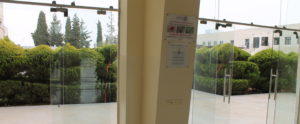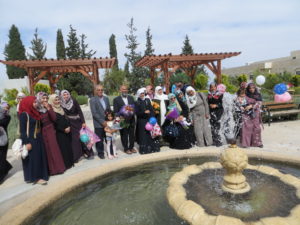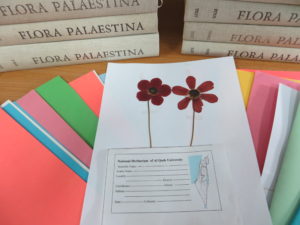Al Quds Botanic (AQUB) Garden, Jerusalem, Palestine

Country: Palestine
- NAME Al Quds Botanic (AQUB) Garden
- ADDRESS Abed Elhamaid Shoman Street Beit Hanina – Jerusalem, Palestine
- WEBSITE www.alquds.edu/en
- EMAIL ksawalha@staff.alquds.edu
- PHONE +(972)-(2)-5838652, 5838654, 5838648, 5838650
- OPENING HOURS Open to staff, students and university visitors from 8:00 am to 15:00 pm.
- OWNERSHIP Al-Quds University (NGO)
- DIRECTOR Dr. Khaled Sawalha
- FACILITIES Herbarium with more than 1000 botanical accessions representing Flora Palestina. Seed bank with focus on medicinal and aromatic native plants. Natural museum with botanical (wood and dry herbs) and preserved animal exhibits. Botanical research lab.
- AREA (IN SQM) 10,000 m2
- NUMBER OF SPECIES There are at least 50 plant species (trees and shrubs) grown in AQUB Gardens, in addition to approximately 100 wild plant species. Moreover, research efforts are being made to document all flora in campus sites.
- COLLECTIONS The first section is Rock Botanic Garden, established to host native flora of both trees, shrubs and selected medicinal plants from Palestine. Andalusia Botanic Garden hosts economic fruit trees such as: palm dates, citrus, cherries and pitacia; and aromatic shrubs like: lavender and rosemary, all of them grown according to an Andalusia designed model garden for the conservation and exhibition of live plant collections among water canals and fountains. The conifer garden has a long-age conifer small forest collection. The olive collection is an important site of the AQUB campus to show more than 30 years-old olive trees, as the typical Mediterranean economic tree. The Merameya (sage) restaurant was established among conifer trees to reflect the use of wild aromatic shrub by native Palestinians, and at the same time, to host university visitors for food services.
- CONSERVATION PROGRAMMES AQUB Gardens were established to meet the urgent need for biodiversity conservation in Palestine. Rock Botanic Garden was established to promote ecological restoration in the campus’ site, by using stone mines wastes to design the garden. More than 20 native plant species of wild trees, shrubs and fruit trees were introduced to AQUB Gardens. The Andalusia Botanic Garden has become a remarkable botanic site and a model for conservation, education, tourism and social activities (i.e. graduation ceremonies).
- RESEARCH PROGRAMMES
- Conservation of biodiversity: from traditional practices to biotechnological applications. Focus on endangered plants which belong to Flora Palestina.
- Botanic Gardens as active sites for: the conservation of plants, education, research and ecotourism.
- Seed bank for: collection, identification, storage and checking seed viability. Native plant collection related to conservation of genetic resources.
- Molecular analysis of genetic diversity and establishment of gene banks for developing local crops.
- Herbarium as an ideal plant collection for classification and references for plant surveys.
- Natural heritage sites in Palestine: conservation of both archaeological monuments and biodiversity.
- Spiritual values to conserve nature and biodiversity: Focus on Islam and Christianity.
- Bioactive compounds from medicinal Palestinian plants.
- Bio-control of plant diseases in agriculture as safe technology to the environment.
- Natural exhibitions and museums: to increase awareness of students and the public.
- Activation of the relations between culture and nature through dialogue within community or nations; media and exhibitions will be used.
- Ecotourism as a viable positive approach towards nature.
- Conservation of natural resources: water and biodiversity.
- Investing in nature: using natural resources in sustainable approach.
- Science, bioethics and religion: creation or evolution.
- Identification of biodiversity hot spots, declaring natural reserves and establishing eco centers to adopt conservation of nature.
- Regional cooperation in conservation of nature.
- Climate change: to meet the challenge at national, regional and global levels.
- EDUCATION PROGRAMMES We can underline de following education actions:
- The Al Quds Botanic Garden is used regularly in education as field and scientific tours concerning biology, botany and biodiversity fields.
- Visitors and guests of Al-Quds University are guided in tours of AQUB gardens. They enjoy and appreciate the gardens as a national and natural site of conservation.
- Collaboration between AQUB gardens and the Palestinian Ministry of Agriculture is established to coordinate in conservation of nature and to establish a botanic garden at Al-Aroub agro-station under supervision of AQUB gardens.
- Scientific Forum for Conservation of Nature is launched in Palestine (2017) to join Palestinian universities and environmental activists with Al-Quds University as chairman.
- Students undergraduates and post graduates are advised to conduct research and graduation seminars during their studies: with focus on medicinal plants, AQUB gardens provide the botanical specimens for research and to confirm the identification of plant species.
- ECOPAL FORUM, whose aim is to raise awareness and mitigate the dangers that Palestinian nature is facing. The experience and knowledge will be employed for active programs dealing with nature in sustainable approaches.
 Al-Quds University is a Palestinian academic institution and is functioning according to regulations of the Ministry of Higher Education – the Palestinian Authority. The University main campus is located in Abu-Dis (West Bank), east of the old city of Jerusalem. The University consists: Faculty of Science & Technology, Faculty of Medicine, Faculty of Allied Health, Faculty of Pharmacy, Faculty of Dentistry, Faculty of Engineering, Faculty of Law and other faculties. The primary object of establishing the Botanic Garden at Al-Quds University/ Abu-Dis is to preserve Flora of Palestine and other related biodiversity members to suit Andalusia design. The proposed Andalusia Garden is planned to host live plants that grow in Mediterranean environment.
Al-Quds University is a Palestinian academic institution and is functioning according to regulations of the Ministry of Higher Education – the Palestinian Authority. The University main campus is located in Abu-Dis (West Bank), east of the old city of Jerusalem. The University consists: Faculty of Science & Technology, Faculty of Medicine, Faculty of Allied Health, Faculty of Pharmacy, Faculty of Dentistry, Faculty of Engineering, Faculty of Law and other faculties. The primary object of establishing the Botanic Garden at Al-Quds University/ Abu-Dis is to preserve Flora of Palestine and other related biodiversity members to suit Andalusia design. The proposed Andalusia Garden is planned to host live plants that grow in Mediterranean environment.
Several plant species has been introduced in the Garden for conservation, enjoyment of botanical beauty and ecotourism. In addition to the above, the botanic garden will be used for education, botanical and horticultural research.



